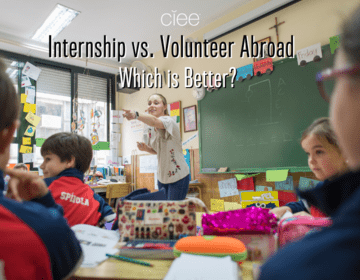First generation college student breaking stereotypes
My sun-kissed skin, thick black eyebrows and dark brown eyes, scream Latina, or at least they did to me. During my first week at the University of Botswana, this was not the same perception my fellow classmates had of me, instead, I came to the realization that I was seen as another “White American” studying abroad. Such label had me “shook” for a few days. Knowing that I was labeled “White” was a bit uncomfortable. By being considered what in America is the most affluent race, didn’t quite sit well with me. Such label felt like I was given privilege that I lack in America, and I wanted to change that.
Coming to Gaborone, Botswana has been such an interesting experience, as I am not the typical international student my fellow Batswana classmates are used to seeing. I am a first-generation college student, meaning I am the first in my family to attend college. I was born in Mexico but raised in California as my family emigrated to the United States for better opportunities. Being a first-generation college student studying abroad hasn’t hindered my experience in Gaborone instead, it has helped me realize that I share many similarities with my local classmates. As I got to learn more and more about the Setswana culture, the typical household and family structure and struggles in a Botswana family, I realized that although we are from different parts of the world, I share many things in common with the local Batswana community. To my surprise, there are way more things I share in common with my local friends than I do with my fellow American international students.
As I became aware of these similarities, part of me started to feel more at home and connected to the culture. However, I could tell that such similarities weren’t evident to most of my local classmates. But in one of my social work classes, I was able to share my story and make an impact on my 200 classmates who had the idea that all those who come to Botswana from America to study at UB are white. It all happened like this. During my social work lesson my professor, Gloria Jacques called me in front of the class and asked me to introduce myself and share my perspective as a Mexican in America. As a slight introvert who hates being the center of attention and dislikes public speaking, I was melting in my chair, turning red, and hoping I could briefly share from where I was sitting. Unfortunately, that did not happen. I walked to the front and was able to tell my story. Although I was an anxious mess in the beginning, I got pretty comfortable and gained courage when sharing the fact that I am a first-generation college student breaking new boundaries and taking on opportunities that minorities in America don’t really have the chance to partake in. I was able to share that as a proud Mexican brown girl, I am here representing my community, my culture and other first-generation college student navigating the education system on their own in an attempt to maximize their overall well being.
If it wasn’t for this opportunity to really introduce myself properly to my class, many of my classmates would have never known much about me besides the fact that I was the only international student (or as they liked to think, the “American”) in class. As cliché as it sounds, “there is more than meets the eye” and I am glad that as a first-generation college student studying abroad, I was able to teach a few of my classmates that not everyone who studies abroad is white, affluent, or comes from a college educated family, as that is the belief. America is a melting pot of cultures, family structures and educational backgrounds and I am glad I was able to share a different perspective than what many are used to. If you are a first-generation college student considering studying abroad, don’t think about it twice. Go for it, go beyond your limits, you’ll pave the way for others, while simultaneously enhancing your own educational experience outside the U.S.
Related Posts
Study Abroad in Botswana Africa
For my study abroad, I chose the Community Public Health Program in Gaborone Botswana during the Fall 2024 semester. I am a public health major on a pre-PA track and... keep reading
A student perspective
The Highs and Lows As a last minute addition to the Gaborone program I wasn’t sure what to expect. My lack of research into the culture and community made me... keep reading
Internships vs. Volunteering Abroad: Which is Better?
Are you looking for internship or volunteering opportunities while abroad? You’re in luck with CIEE! Follow along as we detail the differences between internship vs. volunteer work and what you... keep reading








